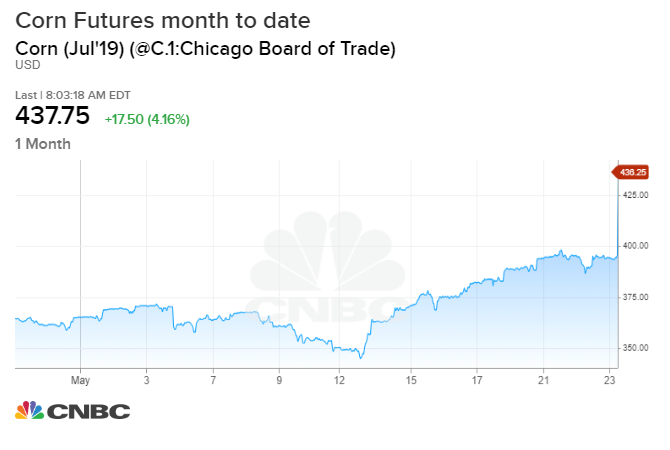Corn is loaded into a truck during harvest in Malden, Illinois.
Daniel Acker | Bloomberg | Getty Images
Corn futures are surging, up 20% for the month and nearing a 3-year high, as heavy rain forecasts across major farming areas pose risks to delay planting even further. The crop is leading a surge in most soft commodities this month.
Corn futures are up 4% on Wednesday, hitting their highest level since June 2016, while other key commodities like soybeans and wheat also trend upward. Soybean futures are up 3.5%, their highest level since April 16 and wheat futures are up almost 3%, hitting their peak since February 14.

"Now the market's in a situation where you're gonna have very low inventory levels, very slim plantings and by next spring it could be a real issue," Peter Boockvar, chief investment officer of Bleakley Advisory Group, told CNBC's Squawk Box Wednesday.
Corn futures are up more than 20% this month, while soybean futures have risen more than 2% in May and wheat futures are up more than 18% this month.
In a record-breaking wet spring, flooding in key farming regions have caused unprecedented delays to planting, causing lower-than-expected inventory levels. In corn, 58% of the intended planting has been done, compared to 90% at this point historically. For soybeans, only about 30% has been planted, versus about 65% normally, said Boockvar.
Going back to USDA data to 1980, "its never been this delayed," he said.
"We see ongoing bullish price risks for corn if wet weather persists through May/early June, as farmers may reduce corn area and shift sowing towards late-planted beans, a bearish risk for the oilseed complex especially if the White House subsidizes soy production. We are more neutral wheat, which has been dragged higher by corn," CitiGroup said in a note to clients earlier this month.
Alongside bad weather, the U.S.-China trade war is further complicating the planting picture. Before trade tensions heightened, China was responsible for more than 60% of soybean exports.
Last week, President Trump announced a $16 billion farm aid package to help farmers, a group that played a major role in Trump's 2016 victory, who have been hit by the trade war. The farm aid legislation will compensate farmers, mainly in cash payments, for about 10-months of trade war loses.

Source: Finviz.com
The rise in commodity prices will also have an impact on restaurants, which have thin margins as it is, said Boockvar. Food prices are about 30% of a restaurant's cost base with labor making up pretty much of the rest of the balance, he said.
"There's not much room to handle a rise in food prices," said Boockvar.
— with reporting from CNBC's Michael Bloom.
via IFTTT
No comments:
Post a Comment